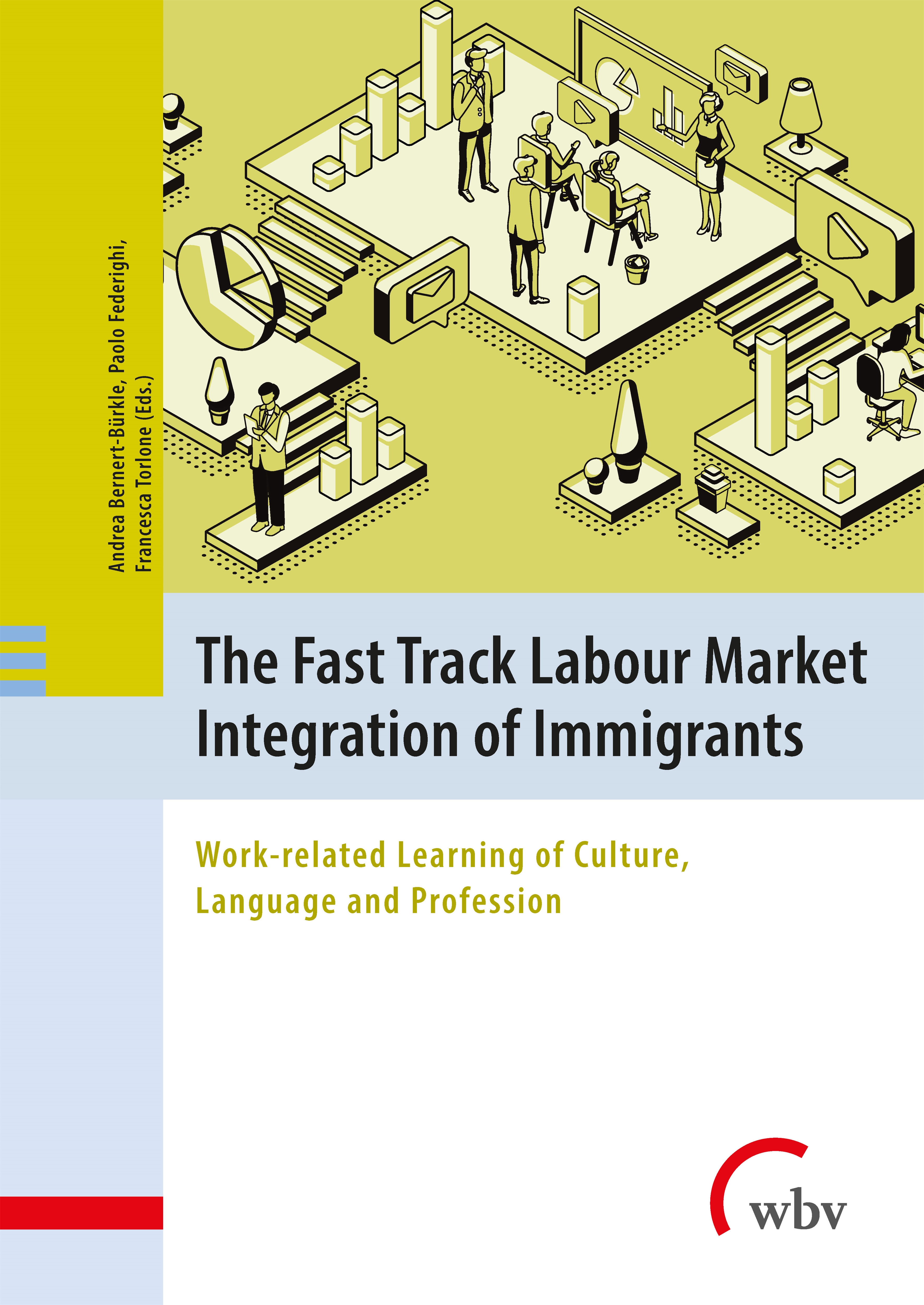The Fast Track Labour Market Integration of Immigrants
Work-related Learning of Culture, Language and Profession
Die Autor:innen evaluieren die Ergebnisse des Trainingsmodells aus drei Jahren in Norwegen, Schweden und Deutschland. Die ausgewerteten Daten spiegeln die Erfahrungen von 400 Teilnehmenden. 20 Fallstudien ermöglichen detaillierte Analysen.
TALENTS wurde gefördert durch das Erasmus+ Programm der Europäischen Kommission sowie vom Bundesministerium für Bildung und Forschung. Alle TALENTS-Projektmaterialien sind unter https://talentseuproject.com verfügbar.
Die Publikation richtet sich an Stakeholder der Bildung und Integration erwachsener Zugewanderter - insbesondere Leiter:innen von Erwachsenenbildungseinrichtungen, Lehrkräfte, Mitarbeiter:innen in Arbeitsmarktservices, Fachkräfte in Wirtschaftsverbänden, Kammern und Unternehmen sowie Akteur:innen, die Arbeitsmarktintegrationsprozesse und -programme planen und finanzieren.
Andrea Bernert-Bürkle
Introduction
Paolo Federighi
1 The fast track labour market integration of immigrants. The potential of work-based and workplace learning
1.1 Meanings and functions of fast track labour market integration
1.2 The educational conditions of refugees and their latent employment potential
1.3 The "Snabbspår" - the Swedish model of accelerating labour market access for immigrants
1.4 How to do it: the basic field of action
1.5 The basic functions
1.6 Issues of research methodology
Francesca Torlone
2 Fast track labour market integration of refugees. A systematic literature review
2.1 Introduction to the methodology
2.2 Sources
2.3 Review of learning for fast track labour market integration
Contributions by Andrea Bernert-Bürkle, Nadja Barocke, Selma Heilmann, Heidi
Hofsmo, Ralf Lenhardt, Francesca Torlone, Åse Karen Westad Fjeld, Petter Yttereng
3 The political and organisational framework: A multi-stakeholder approach as a success factor in fast track labour market integration programmes
3.1 Introduction. Close cooperation between Job Centres, companies, training institutions and other actors
3.2 The role of matching labour demand and supply
3.3 Workplace learning potential in hotel settings
3.4 The role of adult learning organisations: managing a cultural and organisational change
Peter Härtel and Michaela Marterer
4 A pathway of continuous guidance for a personalised approach
4.1 Introduction. Guidance within the framework of fast track labour market integration
4.2 Reasons for a new understanding of guidance
4.3 Conclusions for understanding guidance
4.4 Principles and criteria for rethinking guidance
Contributions by Åse Karen Westad Fjeld, Valborg Svånå, Marcus Persson, Johanna
Togelid, Andrea Bernert-Bürkle, Sarah Lukas, Anika Schneider, Esther Dam,
Roswitha Klepser
5 Managing the fast track labour market integration process
5.1 Introduction
5.2 Cultural development. Process and methods for a fast track labour market integration
5.3 Linguistic development: process and methods for a fast track labour market integration
5.4 Professional development: processes and methods for fast track labour market integration
5.5 Training of key actors in fast track labour market integration programmes
Rolf Ackermann and Paolo Federighi
6 Conclusions
weitere Infos
Vorgestellt werden Ergebnisse des europäischen Modellprojekts TALENTS zur schnellen Integration von Migrant:innen und Geflüchteten in den ersten Arbeitsmarkt. Ausgehend von der Idee, dass Teilhabe am Arbeitsmarkt die gesellschaftliche Integration fördert, verbindet das Trainingsmodell Arbeitserfahrungen in Betriebspraktika mit sprachlichen, kulturellen und beruflichen Inhalten, die im Klassenverband erlernt werden.
Die Autor:innen evaluieren die Ergebnisse des Trainingsmodells aus drei Jahren in Norwegen, Schweden und Deutschland. Die ausgewerteten Daten spiegeln die Erfahrungen von 400 Teilnehmenden. 20 Fallstudien ermöglichen detaillierte Analysen.
TALENTS wurde gefördert durch das Erasmus+ Programm der Europäischen Kommission sowie vom Bundesministerium für Bildung und Forschung. Alle TALENTS-Projektmaterialien sind unter https://talentseuproject.com verfügbar.
Die Publikation richtet sich an Stakeholder der Bildung und Integration erwachsener Zugewanderter - insbesondere Leiter:innen von Erwachsenenbildungseinrichtungen, Lehrkräfte, Mitarbeiter:innen in Arbeitsmarktservices, Fachkräfte in Wirtschaftsverbänden, Kammern und Unternehmen sowie Akteur:innen, die Arbeitsmarktintegrationsprozesse und -programme planen und finanzieren.
The results of the European model project TALENTS for the rapid integration of migrants and refugees into the primary labour market are presented in this study. Based on the idea that participation in the labour market promotes social integration, the training model combines work experience in internships with linguistic, cultural and vocational content that is learned in class.
The authors evaluate the results of the training model gained in three years in Norway, Sweden and Germany. The evaluated data reflect the experiences of 400 participants., 20 case studies allow for detailed analysis.
The TALENTS project was funded by the Erasmus+ Programme of the European Commission and the Federal Ministry of Education and Research (BMBF) All TALENTS project materials are available open access at https://talentseuproject.com.
The publication adresses stakeholders in education and integration of adult immigrants - in particular heads of adult education institutions, teachers, staff in labour market services, experts in trade associations, chambers and companies as well as actors who plan and finance labour market integration processes and programmes.
Schlagworte
- Arbeitsplatz
- Berufsbezogenes Sprachtraining
- Employment
- Erwerbstätigkeit
- Fast-track integration
- Flüchtlinge
- Immigranten
- Immigrants
- Integration
- Intercultural learning
- Interkulturelles Lernen
- Labour market integration
- Lehrkräfteausbildung
- Lernprozesse
- Mentor
- Refugees
- Sprachen lernen
- Teacher training
- Work-related language training
- Workplace
